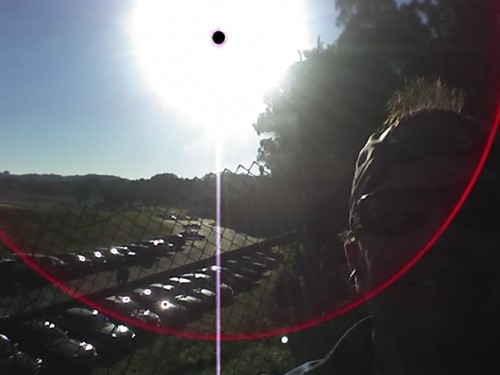OK, I’m starting to get a little frustrated. Ive been doing everything by the book in training for the upcoming marathon in March, but it seems that my body has other plans.
It was an absolutely gorgeous Saturday morning and a perfect day for walking in San Francisco, but once again, a couple hours after finishing the walk ( 13 miles this time), my lungs decided to protest by clamping down really tight and putting me through another evening of hell . Within just 2 hours of completing the 3.5 hour walk, my peaks flows dropped from 350 to 130. It took a full 24 hours of back to back neb treatments and an epi-pen shot just to get me back into my yellow zone. As I write this post my PF is back up to 290 ( which is still 80 below my baseline), and I’m still very SOB.
I hesitate in calling this event “exercise induced” , because generally , exercise induced asthma flare-ups occur during the exercise , not after it. I did feel a little tighter than usual at the beginning of the walk and probably used my inhalers more than the normal for me , but I didn’t feel so short of breath that I had to stop at any point. I was actually having more problems with the muscle pain in my shoulders and neck than with my breathing. In a way , I think Ive become so conditioned to being short of breath when I exert myself for long periods, that I don’t sense the decline in my lung function until it reaches a dangerous level.
This sensory disconnect, if you will, is starting to get really problematic for me. If only there was a way I could more accurately judge how tight I’m getting in advance, perhaps I could prevent some of these flare-ups from progressing . I’ve even considered taking a peak flow meter along on my walks, but I’m not sure how useful the results would be, since my breathing pattern would be affected by the exercise even if I was breathing OK .
It’s no secret to the people who read my blog know that I have a tendency to “over do it” when it come walking, and that sometimes this over zealousness can lead to bouts of hyperinflation and air trapping after the event. But, these most recent post walk flare-ups seem to come out of the blue with symptoms that intensify very rapidly. First I’ll feel a little SOB, then I’ll start wheezing diffusely, and then my PFs will totally bottom out …all within a matter of minutes! Basically a full pledged , bronchospastic, classic text book asthma attack. I don’t like this one bit.
So I guess the big question is, am I gonna have go through this every time I do a long walk from now on ? or were these last two episodes just flukes?
So far, Ive been lucky and have turned around without having to hightail it to the ER , but next time who knows. And if I’m getting this sick after only 13 miles, whats gonna happen after 26 miles? It’s a kind of a scary thought when you consider that my next 26 miler is supposed to take place 6,000 miles from home.
My next scheduled walk is supposed to be 10 miler next weekend, followed a 15 miler the week after. Assuming I’m breathing well enough to walk by then, I think the 15 miler will be the deal breaker as to whether or not I will (or should) walk Rome this year.
Here’s some phone pics from the happier part of the day. (Hard to believe that there was an attack brewing).






Glad you’ve not ended up in hospital, but sorry to hear that you’ve been suffering. I always find my attacks occur quickly and sometimes without any warning. One minute I’m breathing fine and the next I’m so out of breath I’m almost blue.
Hope the out of hospital thing continues for you! 🙄
Hi: Been following your updates. Take care of yourself! Just spent two and a half days in local hospital with asthmatic bronchitis last week. Lots of IV solu medro, IV levequin, nebs, etc. Now recovering at home, with pulmocort/xopenex nebs plus oral pred plus taking it easy. Will gradually build back up to my strolling pace from my current “old lady death march”. I did get in one good open mic before my lungs decided to crap out LOL! Keep on keeping on!
P.S. posted a couple blogs on my hospital (mis)adventures:
http://www.myspace.com/gaylemyrnamuzak
Gorgeous pics. I love SF :). I am keeping my fingers crossed for your 15-miler.
“I think Ive become so conditioned to being short of breath when I exert myself for long periods, that I don’t sense the decline in my lung function until it reaches a dangerous level.”
That must be incredibly difficult. Your case is way more severe than anything my kid will have to deal with, obviously, but I keep telling her she needs to get used to paying attention to her early symptoms b/c one day it will all be her responsibility instead of mine–sensory disconnect never occurred to me, but I could see it being a problem for most child-to-adult asthmatics, even milder ones.
After all, if you’ve lived your whole life with “abnormal” (for lack of a better word) breathing, how can you tell what normal is?
I need to keep this in mind as she gets older, I think–thanks for sharing!
Hi Amy, Thanks for the comment . This is an important topic for me because it effects my life profoundly.
I don’t think you have anything to worry about with asthmagirl.
“Under-perceivers” as we are called in the asthma research world, is a rare, but a very real and problematic phenomena for some asthmatics. Thankfully it affects mostly adult males who have had life long disease.
At the other end of the spectrum (and much more common) are ” over-perceivers” These individuals tend to be hypersensitive to even the mildest of symptoms, often panicking and over reacting which makes their breathing feel worse than it actually is.
The best tool available to help in either of these situations , is education and common sense ( I don’t always exhibit the latter).
In my case, I’ve learned to rely heavily on my peak flows to see if they correlate with how I feel at any given time. (I have one of those fancy electronic ones that uploads to a database so that they track trends.) I check my PF’s 4-8 times a day, even if Im not having symptoms.
There are many times when I might feel tight for example, but my peak flows will be totally normal. ( This usually means Im air trapping). There are other times that I’ll feel only slightly short of breath, but my peak flows will be in the red zone ( this means I having a full blown exacerbation).
This is not to say, that I have absolutely no awareness of my own symptoms, of course I do. I would have been dead by now If I didn’t. I’m fully aware when Im SOB , its just that sometimes theres a delay in my brain processing the severity of my symptoms. And because of that delay , I dont alway take the appropriate actions soon enough. (Confusing I know)
Hey! Sorry I haven’t visited your site in awhile. I was having trouble getting it to work. Anyway, I’m sorry to hear about your recent bout of breathing issues. What a let-down for you. I hope you can get things figured out!
I have to tell you, I cracked up about your abbreviation of SOB. It took me awhile to figure out your were referring to being short of breath and and not a son of a …… 🙂